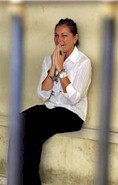Australian Complicity
This proposition not only fits all the constituent information neatly into place from the Indonesian side of the equation, but also many of the almost inexplicable events in Australia.
THE ROLE OF THE AFP
Some of the activities of the AFP individually are well documented, although other documentation is conspicuous by its absence. Equally, the number and scale of certain coincidences renders it almost impossible to conceive them all as such.
The following aspects have all been previously reported through diverse sources:
The Reported Friendship
The reported personal friendship of Chief of Bali Police Pastika and Head of the AFP Keelty [12] has already been referenced.
The Bali 9
There was the effective delivery of the Bali 9 to the Indonesian regime, as referenced previously.
The AFP were well aware of the Bali 9 situation: a situation in which a group of foolish youths provided themselves to carry heroin in an Islamic country. One of their concerned parents had even tipped them off, so that they could actually arrest the group well before they left the country! But the AFP chose not to: they allowed them to proceed to Bali, with dire consequences.
But why would they purposely sacrifice the nations own youth in this manner? Here is one obvious answer: to gift the Indonesian regime the capital drug offence it craved for, and which it was now struggling to implement with respect to Schapelle Corby. Perhaps it was as a quid pro quo for favor, or alternatively under pressure, with respect to anti-terrorism co-operation.
Missing CCTV Footage
Schapelle Corby begged for CCTV footage to be provided from Sydney and Brisbane airports so that they would show that her bag was empty on departure. After initially stating that the Brisbane footage was in good order, the airport later changed this to state that the cameras were being repaired, and then finally to a story that they were turned off.
The Sydney airport and Qantas situation was even more disturbing. Despite a major drug operation being underway and a flight carrying cocaine being there at exactly the same time as Schapelle was on the airport [15], they too stated that they had no CCTV footage available. This despite the airport (and airline) having a very comprehensive CCTV system in place, including coverage of the baggage handling areas [28].
No cameras running / footage available across two major airports, post 9/11 and post the Bali bombings? One of those airports being a direct international link to a Muslim country, and whilst a drugs operation is underway at that very airport? Do they really believe that to be a credible story? .
A common denominator with respect to security matters such as these across two different airports in Australia? Yes, the AFP.
Police Corruption
Operation Mocha was a joint investigation by Australian Federal Police and the NSW Crime Commission into a drug syndication ring. It embraced the cocaine shipment at Sydney airport at exactly the same time as Schapelle Corby landed. In fact the flights overlapped by over 3 hours [17].
The head of Operation Mocha was former Assistant Director of the NSW Crime Commission Mark Standen - who was later arrested for conspiring to import drugs into Australia [16] [1]. As operation head the sphere of his influence was clearly significant, but details of exact actions remain vague.
Standen, an ex-AFP officer, had worked in the same office as Michael Keelty [18] in Sydney. Whilst Keelty denied reports in The Australian newspaper that he and Standen were close [19] [20], he conceded that they ‘might’ have been involved in some of the same operations [18]. Nonetheless, this clearly illustrates the seniority of Mr Standen.
The Whistleblower
Then there is the mysterious death of a so-called ‘whistleblower’in 2002. Gary Lee-Rogers was an Australian Protective Service assistant inspector, who complained about corruption that compromised security at Sydney Airport and who predicted he would be killed because of what he had allegedly discovered [5] [6] [7].
The Statement to Indonesia
There is also the behavior of the media savvy AFP commissioner, Michael Keelty, himself. It doesn’t take too long to establish how damaging his media comments were to Schapelle Corby and how helpful to the Indonesian court. These include his statement during the legal process itself dismissing the baggage-handler proposition [21] [2]: it is not difficult to imagine the music to the ears of the Indonesian regime as he made this remark.
The president of Law Council of Australia himself felt moved to comment on this: “It is potentially damaging to the Corby defence, as it will no doubt be transmitted to Bali” [4], with Schapelle Corby’s lawyer referring to it as "an absolute disgrace".
The words "There is very little intelligence to suggest that baggage handlers are using innocent people to traffic heroin or other drugs between states" are easily translated to “do what you want with her, there will be no difficulties from the police at this end” in the context of the reality of Schapelle Corby’s situation.
It should be noted that the AFP were actually in the process of investigating the very thing which Schapelle Corby’s lawyer was suggesting,via Operation Mocha!
The Non-Investigation
There are also the questions pertaining to non-investigation. On their own terms, surely “convicted drug smuggler Schapelle Corby” must therefore have been a drug smuggler. In which case, wouldn’t the AFP have had some sort of interest in the source of those drugs? Wouldn’t they have investigated openly, and made arrests in Australia?
Perhaps they didn’t investigate because contrary to the impression their public comments created, they knew that Schapelle Corby was innocent. An investigation would not only have been a waste of resource, but worse still, could easily demonstrate Schapelle Corby’s innocence and potentially the real nature of the case.
THE ROLE OF THE AUSTRALIAN GOVERNMENT
The Australian government found itself impaled on the hook of public opinion. They will almost certainly have been well aware of the real issues behind the Schapelle Corby case, but in the pragmatic world of international politics, they eventually adopted a pragmatic approach.
Essentially, the importance of their strategic relationship with Indonesia trumped Schapelle Corby’s human rights. For the government, the only two aspects here were that key relationship and the vagaries of public opinion.
However, does this constitute actual complicity? Or simply a dereliction of its duty to support one of its citizens? The evidence suggests that the answer is complicity.
AFP Complicity
The AFP is a government agency and thus responsibility for the complicity of that agency is ultimately the responsibility of the government.
Lack of Assistance
Given the high profile nature of the case, the legal and human rights abuses [13] to which Schapelle Corby, an Australian citizen, was subjected, were patently clear to the government. Yet they failed to intervene. Equally, they failed to use routes such as the Mutual Assistance Treaty to press the issue of testing the drugs for country of origin, for example.
Opinion Management
It is suggested that to extract itself from the hook of public opinion the government enabled (even encouraged) a grotesque media smear campaign against Schapelle Corby’s family.
A correspondent commented: “Schapelle Corby was not the ‘surfer druggie guy’ the Indonesians had expected to land at Denpasar Airport, so the media set about shifting public perception to make her as close to that as they could get away with”. With reference to the segment on Denpasar Airport, he continues “‘Snow White’ was effectively being opinion managed to become the ‘Wicked Witch’. Perception was being adjusted to allow the Indonesians to treat her as they would have treated the drug-consuming lifelong criminal they thought they would haul in at the outset.”
The government clearly understand the media and opinion management. They are politicians and they know, by trade, when people are being influenced and how to influence opinion. That is their world on a daily basis, as their day job.
They knew what was transpiring with respect to the media, but at the generous end of the scale, they did nothing to stop it. At the less generous end, they encouraged it and orchestrated it. [22].
Direct Commentary
Politicians even intervened via carefully issued statements of an extremely damaging nature. For example, via the ministerial statement of support for AFP Commissioner Keelty’s extremely harmful comments whilst the legal process was in motion (see above) [4].
The issue of these damaging comments was also raised at a Legal and Constitutional Legislation Committee Senate meeting. When Keelty was pressed on why he made them at that point in time and on what basis, the Minister for Justice and Customs (Senator Ellison) intervened with “I would say to the committee that this is a matter which is before an Indonesian court which is listed to hand down its decision this Friday. It is at a very sensitive stage of the hearing and I think that the committee should exercise due care in the way it deals with this issue, having regard to the fact that this matter has now reached the stage of proceedings that it has” [27]. Yet presumably it was perfectly fine for Mr Keelty to make his hugely damaging comments publicly just a few weeks earlier?
Shortly after the sentence, Foreign Affairs Minister, Downer even defended the show trial, with all its clear legal and human rights abuses: “Just because courts are in Indonesia isn't a reason to conclude that their courts are somehow completely corrupt and unacceptable.” [23].
He later stated: “It's been said the AFP provided information leading to the arrest of the Bali Nine and they should have done more to help Schapelle Corby. My argument is simple. We need to work with the Indonesians to stop the drug trade. And the moral of the Bali Nine and Corby stories is simple: don't traffic in drugs, it's a hanging offence in Asia.”. Why would he go out of his way to specifically mention Schapelle Corby by openly inferring her guilt in a statement to the media?
Confiscation of Book Royalties
Royalties from sales of Schapelle Corby’s book were intended to help soften some of the terrible pain of certain aspects of an ordeal in a foreign prison: for example, fund visits by her mother from her native Australia. However, in January 2007, Australian Justice Minister, Chris Ellison, suggested that the proceeds from the sale of the book could be confiscated under the proceeds of crime act. A few months later, in a closed court, government solicitors were granted an order that froze the accounts where the money was deposited. The Australian government were again effectively signaling that Schapelle was guilty of a crime, despite the all the facts of the case, including the demonstrable legal and human rights abuses.
Ongoing Complicity
Finally, there is the question of what they have done to help her over the passing years. They have all of the above information, and yet she is still there. It is sometimes argued that every day she remains there is essentially another day of national complicity.
Next: References
Return to Main Propositions Page
Labels: afp, australian federal police, australian government, bali 9, cctv footage, corruption, ellison, keelty


